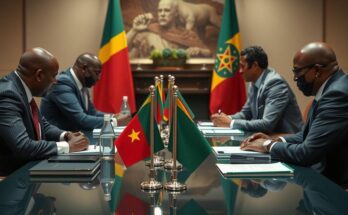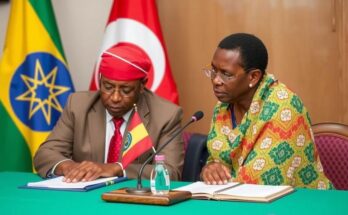World leaders at the recent United Nations General Assembly faced the looming possibility of a widening conflict in the Middle East. Discussions were marked by a sense of urgency regarding the failures of multilateralism in addressing ongoing crises such as those in Gaza and Ukraine. Despite the grim context, the assembly also highlighted a new “Pact for the Future” intended to unite nations in tackling vital global issues, emphasizing the need for reform to ensure equitable representation and actionable commitments across all member states.
During a recent session at the United Nations, global leaders confronted the ominous potential for a broader conflict in the Middle East while reflecting on the need for revitalizing international cooperation. The gathering coincided with escalating tensions due to ongoing conflicts in Gaza, Ukraine, Sudan, and increased military actions by Israel, particularly towards Lebanon. U.N. Secretary-General António Guterres emphasized the urgency of restoring multilateralism, which he believes is currently failing. General Assembly President Philémon Yang described the current global environment as “particularly tumultuous,” highlighting a series of violent conflicts that continue to destabilize member states. He lamented the absence of definitive solutions on critical issues such as climate change and economic inequities. The event also marked the adoption of a “Pact for the Future,” a document aimed at uniting member nations around pressing global challenges. This blueprint is intended to spur actionable commitments from countries, regardless of their economic standing. However, doubts remain regarding its practical implementation, as many leaders have expressed frustration with the inefficacy of the United Nations in addressing the needs of developing nations. Diplomatic discussions revealed a mix of pessimism and cautious hope among attendees. For example, Burundi’s foreign minister criticized the international community’s prevalent self-interest, even while expressing optimism about the multilateral consensus necessary for achieving the goals set out in the pact. Other leaders underscored the necessity of reforming global institutions to ensure inclusivity and representation for vulnerable countries. Notably, U.S. President Joe Biden emphasized the potential for positive change, pointing to past achievements in resolving complex global challenges. He asserted, “Things can get better. We should never forget that.” This sentiment suggests a belief in the power of international collaboration, despite the current crises facing the world. As the leaders disperse to their respective nations, the prognosis remains uncertain, with global conflicts and the urgency for renewed international cooperation serving as poignant reminders of the work that lies ahead.
The United Nations General Assembly serves as a significant platform for world leaders to discuss pressing global issues. Each year, during the high-level week, heads of state and government convene to address conflicts, diplomacy, climate change, and international relations. The recent session highlighted increasing tensions in the Middle East and beyond, while also showcasing a collective yearning for a revival of multilateralism established post-World War II. This year’s assembly particularly reflected the challenges of ongoing conflicts, economic disparities, and the need for innovative strategies to tackle future crises, all interwoven with the urgency to reform how global governance functions to include all member states equitably.
In conclusion, the recent United Nations General Assembly underscored the escalating threat of conflict in the Middle East and the pressing need for a revitalization of multilateralism. While leaders expressed a mixture of concern and cautious optimism, the adoption of the “Pact for the Future” signifies a collective acknowledgment of the necessity for effective global cooperation. The challenge lies in moving from promises to actions, ensuring that international institutions reform to represent all nations adequately, especially underrepresented ones, and addressing the multifaceted crises that threaten global stability and peace.
Original Source: www.washingtonpost.com




